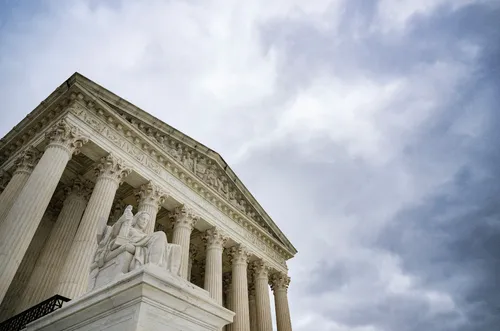
The United States Supreme Court has already begun analyzing a case that could change the course of social media forever. A lawsuit wants to invalidate two laws, one from Texas and the other from Florida, which they say defend freedom of expression in those states.
In practice, they prohibit platforms from deleting political content and profiles, even if they violate network rules on, for example, hate speech and disinformation.
The consequences of this decision could go far beyond US borders.
The Donald Trump issue
“Look, the big motivation behind these two laws… was the case of Donald Trump, back in 2020, when he was expelled from the Twitter platform”, recalls David Nemer, professor at the University of Virginia and author of the book Technology of the Oppressed, who spoke as Brazil in fact.
“Trump had his account banned as he was promoting disinformation, saying that the American elections had been rigged and the election stolen from him, that he had been the big winner. Which ended up being a big motivator for the terrorist attacks that took place on January 6th at the US Capitol,” said David.
The Texas and Florida laws were passed in 2021. Before that, in May 2020, in the early months of the Covid-19 pandemic and 6 months before the last presidential election, Donald Trump announced the so-called “executive order to prevent online censorship ”.
At the time, Trump said: “The choices that Twitter makes when it decides to suppress, edit, blacklist, hide, ban… are editorial decisions. Plain and simple: these are editorial decisions. At this moment, Twitter stops being a neutral public platform and becomes an editor with a point of view.”
Trump’s executive order came as platforms were trying to deal with misinformation regarding the pandemic around the world, including some spread by the then president.
In July 2020, Trump shared a tweet that said that coronavirus had a cure. Twitter quickly deleted the post.
The former president also spread false information about the use of masks and ineffective alternative treatments, such as chloroquine, as did Jair Bolsonaro in Brazil.
Disinformation as a political weapon
Misinformation is a potent weapon and a longtime Trump tactic. This is a way to gain more attention and prominence in the digital world.
“Social networks are extremely important for the far right since all speech, or the posts they promote on these platforms, are, precisely, content that is prioritized by the algorithms of these platforms”, explains David Nemer, “for example, the algorithms tend to prioritize content that generates negative commotion, that is, anger, fear, anxiety… and, generally, misinformation, to go viral, it brings a tone of one of these commotions precisely to have the greatest reach possible”.
At the Supreme Court, judges will have to decide, in practice, what social networks are.
On the one hand, the defense of so-called “anti-censorship” laws state that networks are like public squares and that, therefore, freedom of expression would be guaranteed under the first amendment of the US Constitution.
On the other, the platforms say no: social networks are companies. And just like a newspaper, they have the right to veto content they consider inappropriate.
But for David Nemer, handing over all filtering responsibility to the platforms does not solve the problem:
“It is not enough. As we know, social media is flooded with misinformation. The platforms don’t do enough… in fact, they violate their own terms and services that prohibit a lot of things that happen freely on their platforms. So, today, they have reached a level of power and greatness that the only way to control them, to make them follow legislation, is the State itself”.
Supreme Court in the spotlight
This is just one of many important decisions the Supreme Court is making in early 2024.
On Monday (04), the Supreme Court ruled that Trump is eligible to run in the 2024 elections. The decision was one of the most important made by the court in the electoral sphere since the dispute between George Bush and Al Gore in 2000.
In the coming weeks, the court will also decide whether or not the former president is immune from prosecution for federal crimes allegedly committed during his presidency. The verdict could determine the future of the former president.
Editing: Rodrigo Durão Coelho
Source: www.brasildefato.com.br

